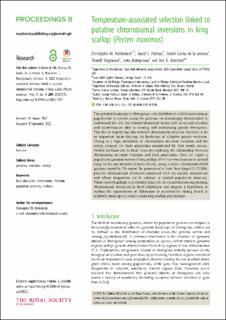| dc.contributor.author | Hollenbeck, Christopher M. | |
| dc.contributor.author | Portnoy, David S. | |
| dc.contributor.author | de la Serrana, Daniel Garcia | |
| dc.contributor.author | Magnesen, Thorolf | |
| dc.contributor.author | Matejusova, Iveta | |
| dc.contributor.author | Johnston, Ian A. | |
| dc.date.accessioned | 2022-12-19T11:57:46Z | |
| dc.date.available | 2022-12-19T11:57:46Z | |
| dc.date.created | 2022-11-14T13:40:14Z | |
| dc.date.issued | 2022 | |
| dc.identifier.issn | 0962-8452 | |
| dc.identifier.uri | https://hdl.handle.net/11250/3038489 | |
| dc.description.abstract | The genomic landscape of divergence—the distribution of differences among populations or species across the genome—is increasingly characterized to understand the role that microevolutionary forces such as natural selection and recombination play in causing and maintaining genetic divergence. This line of inquiry has also revealed chromosome structure variation to be an important factor shaping the landscape of adaptive genetic variation. Owing to a high prevalence of chromosome structure variation and the strong pressure for local adaptation necessitated by their sessile nature, bivalve molluscs are an ideal taxon for exploring the relationship between chromosome structure variation and local adaptation. Here, we report a population genomic survey of king scallop (Pecten maximus) across its natural range in the northeastern Atlantic Ocean, using a recent chromosome-level genome assembly. We report the presence of at least three large (12–22 Mb), putative chromosomal inversions associated with sea surface temperature and whose frequencies are in contrast to neutral population structure. These results highlight a potentially large role for recombination-suppressing chromosomal inversions in local adaptation and suggest a hypothesis to explain the maintenance of differences in reproductive timing found at relatively small spatial scales across king scallop populations. | en_US |
| dc.language.iso | eng | en_US |
| dc.publisher | The Royal Society Publishing | en_US |
| dc.rights | Navngivelse 4.0 Internasjonal | * |
| dc.rights.uri | http://creativecommons.org/licenses/by/4.0/deed.no | * |
| dc.title | Temperature-associated selection linked to putative chromosomal inversions in king scallop (Pecten maximus) | en_US |
| dc.type | Journal article | en_US |
| dc.type | Peer reviewed | en_US |
| dc.description.version | publishedVersion | en_US |
| dc.rights.holder | Copyright 2022 The Author(s) | en_US |
| dc.source.articlenumber | 20221573 | en_US |
| cristin.ispublished | true | |
| cristin.fulltext | original | |
| cristin.qualitycode | 2 | |
| dc.identifier.doi | 10.1098/rspb.2022.1573 | |
| dc.identifier.cristin | 2073571 | |
| dc.source.journal | Proceedings of the Royal Society of London. Biological Sciences | en_US |
| dc.identifier.citation | Proceedings of the Royal Society of London. Biological Sciences. 2022, 289, 20221573. | en_US |
| dc.source.volume | 289 | en_US |
| dc.source.issue | 1984 | en_US |

